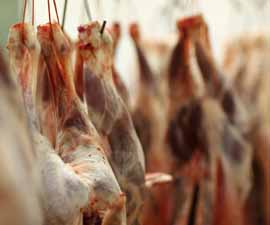Red tape threatens local abattoirs, say campaigners

Over-regulation is threatening the future of local abattoirs and independent butchers, the government has been told.
Red tape and plans to recover meat hygiene inspection costs from slaughterhouses threaten to undermine the viability of abattoirs, claim campaigners.
Butchers, meat suppliers and farmers met DEFRA secretary Caroline Spelman to press their case at the Suffolk Show on Thursday (7 June).
The survival of the local meat industry was vital to farming, to the countryside and to consumers, Mrs Spelman was told during a private meeting.
The campaign is calling on the government to remove regulatory gold-plating from the industry and adopt alternative and affordable charging methods for meat inspection.
It is backed by the Country Land and Business Association, Federation of Small Businesses, National Federation of Meat and Food Traders and the Association of Independent Meat Suppliers.
UK meat inspection charges are already among the highest in Europe.
CLA Suffolk vice-president, Caroline Cranbrook, said: “Unless an affordable, less bureaucratic and more efficient inspection system is introduced, many abattoirs will close.”
Without a local abattoir, butchers, farm shops and farmers would all suffer.
So too would the landscape and the environment, because there would be no local infrastructure to process and market the meat produced by grazing livestock.
“Meat is at the heart of the local food economy,” said Lady Cranbrook.
“Take away local meat infrastructure, then the small food outlets, such as butchers and farm shops will close, with far-reaching repercussions on the whole local food economy.”
Richard Stevenson, of the National Federation of Meat and Food Traders, described food agency guidelines on cross contamination as a “red tape nightmare” for small food businesses.
Norman Bagley, chief executive of the Association of Independent Meat Suppliers, said a recent decision to reject the agency’s plan for full cost recovery was a shot in the arm.
It was important now to introduce a cost-effective, outsourced service that would help and encourage small businesses to grow, rather than shutting them down.
